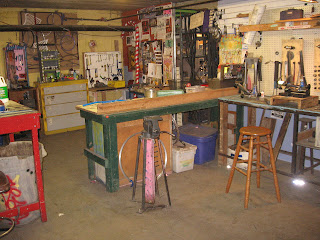
Every town has its bike culture 'feel', and Tucson is no different. Although it has its fair share of Pro riders rolling around, and cyclist's who wouldn't think twice about dropping $10 000 on a rig, there was something different about this place that I was missing.
While exploring through town, I would walk into the typical roadie shop and see $10 000 rigs, stacked against your typical $1000 commuter. There would be Lightweight wheels on the wall($5000 wheels) and more carbon fiber than Nasa's junkyard. I would see things like $80 arm-warmers and accessories that people would need only if they read the mag's cover to cover.
Along with this part of the cycling scene I also saw the most interesting bike builds rolling around under sketchy dirty University students. I wasn't seeing any of these bikes in all the shops I visited, until I flat out asked one of the sketchy University kids about the shops in town. He pointed out some I had been to, but he also mentioned another. I thought I would check it out, and thats when I discovered Bica's bike shop.
While exploring through town, I would walk into the typical roadie shop and see $10 000 rigs, stacked against your typical $1000 commuter. There would be Lightweight wheels on the wall($5000 wheels) and more carbon fiber than Nasa's junkyard. I would see things like $80 arm-warmers and accessories that people would need only if they read the mag's cover to cover.
Along with this part of the cycling scene I also saw the most interesting bike builds rolling around under sketchy dirty University students. I wasn't seeing any of these bikes in all the shops I visited, until I flat out asked one of the sketchy University kids about the shops in town. He pointed out some I had been to, but he also mentioned another. I thought I would check it out, and thats when I discovered Bica's bike shop.
BICA's, I'm told, was developed by the city of Tucson as a way to get transportation to the newer immigrants and lower income classes of the town. Over time it evolved into a hub of bike culture and passion among the community.
There is very little money that exchanges hands here. Most parts are donated(I found a left side drive DA crank today) or are collected through the community. Its taken years for the shop to develop, but now its a very happening place. There are few staff that 'work' there. The place is mostly run by volunteers.
Some interesting things are bike classes that teach you to disassemble and rebuild you bike, movie nights, and the odd music show here and there. There is also a program that teaches underprivileged kids to build up their own bike. After they've assembled it themselves they get to keep it. All for free. There is a safety and maitinence course that teaches you about your bike, then your given a helmet and lock and tube all for free.
Most people see piles and piles of used bike crap(most of it is). But, underneath mostly worn out pieces there is some authentic cycling 'treasure' as I call it. Today while stumbling through a stem box I found a vintage Cinelli steel stem that was about 40 years old. There are piles and piles of neat bits here and there that mostly get thrown out at other shops.
I quickly made my way to the 'back room' where most of the volunteers and employees hide things of interest from the general public. There I found hoards of cycling treasure. Things that come to mind are original handmade Bontrager frames. Brooks leather saddles made in England from the 60's. Campagnolo galore(mostly from the 70's). Everything had a story and could be considered a collectors item.
(look twice, its a smoothie machine)
The most important part of BICA's aside from the decades of cycling treasure is the community. In the humble shop you'll find people of all income levels and all ranges of cycling knowledge. I saw many guys there today who I would have sworn were homeless people(they might have been) but then I looked down and they were wearing a nice pair of Shimano cycling shoes. You get displaced youth who hang out there because they have nothing better to do(reminds me of myself), and middle aged men who come in with their kids.
The most important part of BICA's aside from the decades of cycling treasure is the community. In the humble shop you'll find people of all income levels and all ranges of cycling knowledge. I saw many guys there today who I would have sworn were homeless people(they might have been) but then I looked down and they were wearing a nice pair of Shimano cycling shoes. You get displaced youth who hang out there because they have nothing better to do(reminds me of myself), and middle aged men who come in with their kids.
In most bike shops, I find the ones with the most knowledge are the ones who seem to be the 'snobbiest' or the least likely to give you a hand, where at BICA's those folks are the ones who are walking around asking you if you need a hand...or need help finding something. Its the type of place where YOU LEARN to fix your flat. The shop rate is $4 an hour, but thats for YOU to work on YOUR bike, using their tools.
BICA's is something that surprised and enthused me about the bike business. Its a friendly reminder that you don't need carbon, or aluminum or new rubber. All that matters is that your rolling on 2 wheels. It really is the best bike shop I've ever been to.
















































